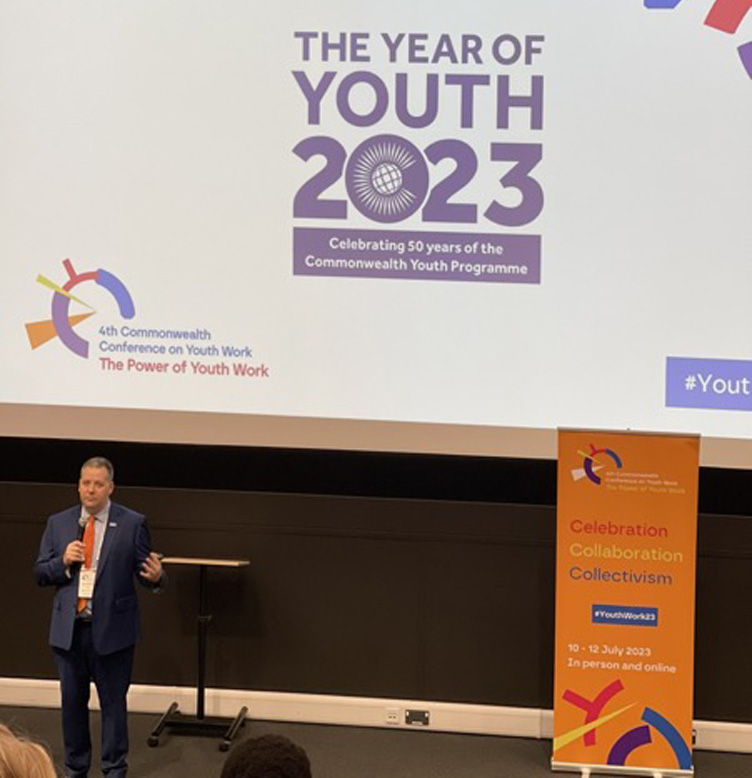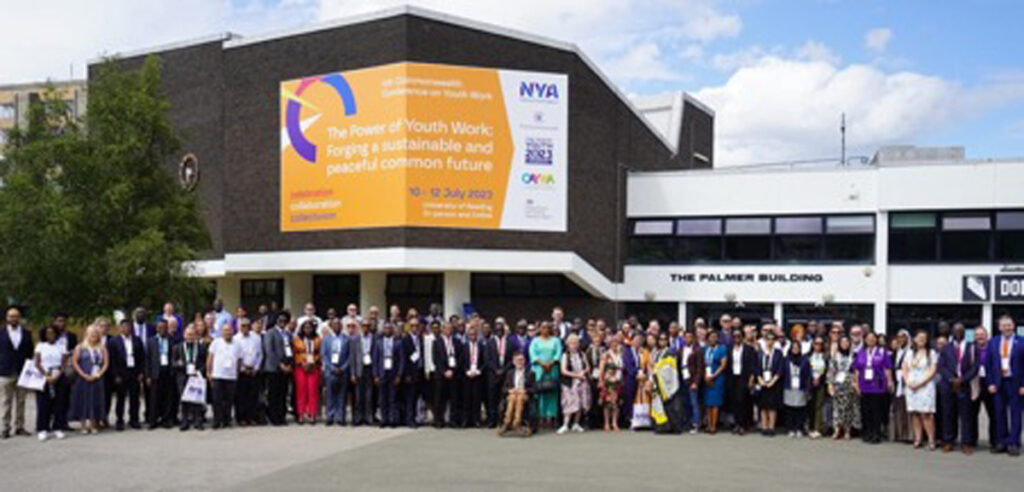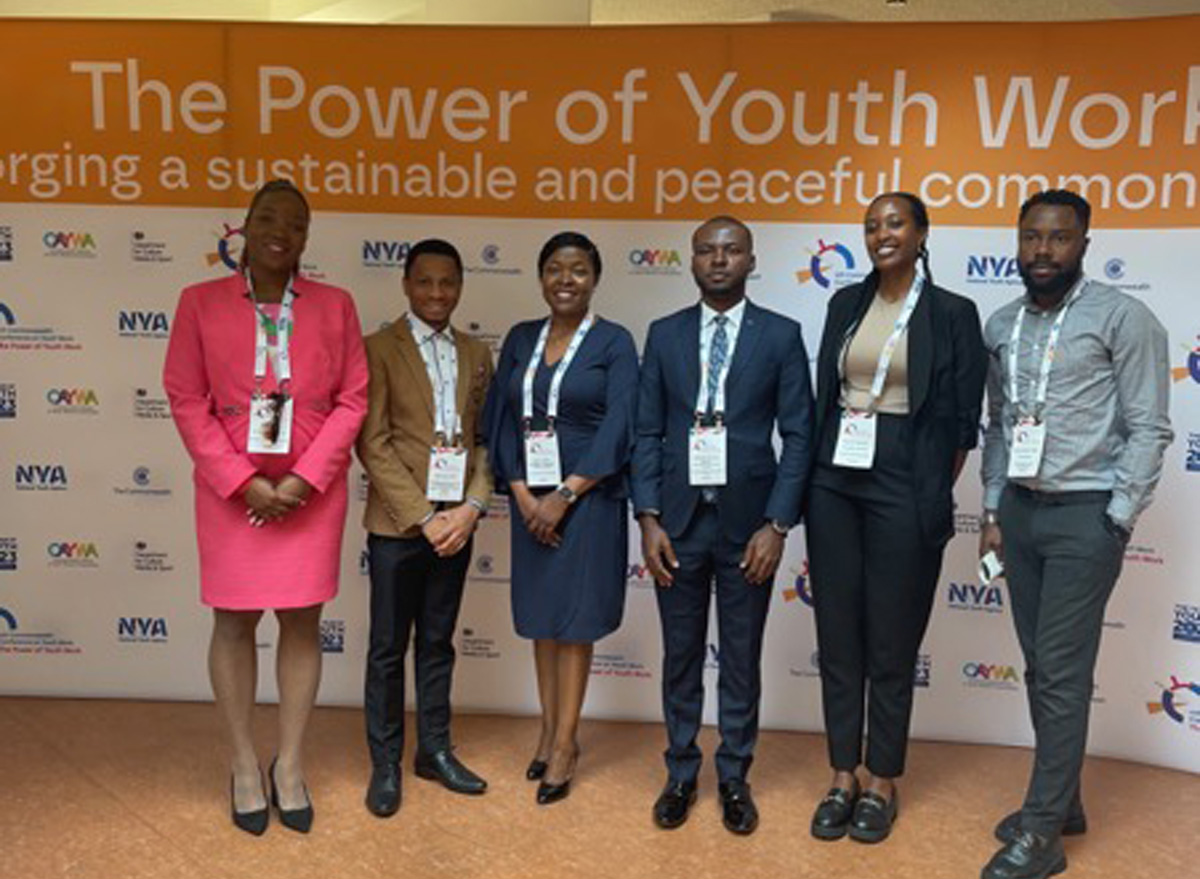Youth Work: A Dynamic Approach to The Commonwealth Vision
August 4by Bryan Jetem Obaji
The declaration of 2023 as the year dedicated to youth-led action for sustainable and inclusive development reminds us that even after 50 years of the Commonwealth Youth Programme, a lot still needs to be done.
This is especially true after the Covid-19 pandemic which reawakened our consciousness to new possibilities and realities of life. The fourth edition of the Youth Work Conference, held July 10 – 12, being the first since the pandemic, showcased new and possible ways of achieving successes with regard to youth work within the Commonwealth and beyond.
The conference was hosted by the National Youth Agency (NYA) and for the first time, could be attended in person or virtually. With more than 1,200 (in person and virtually) participants in attendance, the commitment to driving youth work to the next level was clear. Equally, the conference created a space for nations to demonstrate what youth work can do as reflective in the theme: Celebration, Collaboration and Collectivism.
The pandemic came with its challenges, among them, different levels of breakdown. As such, the conference acted as post pandemic therapy to reinvigorate youth workers in their engagement with young people. Fundamentally, the conference created a legacy of knowledge sharing and expertise; dialogue on the challenges of different countries and practitioners on how things are done and what is required in order for youth work to thrive across the Commonwealth.

For attendees at the previous three editions, the NYA was faced with the daunting task of remodelling the conference to meet with the present reality, including the hybrid arrangement, meeting with the demands of over 1000 participants and archiving all content.
The Conference did not showcase how youth work is done in the United Kingdom but instead created a platform were nuggets of expertise and excellence of long established and well-resourced practitioners in the Commonwealth shared bits and pieces and brainstormed ideas that would collectively enrich each other, transport effective ideas to destinations in need, while keeping in mind the divergent starting point of youth work in various countries.
Uganda’s Minister of State for Youth and Children, Sarah Mateke, described the conference as “a gathering of passionate individuals committed to empowering young people and creating positive change in our societies.” With her wealth of experience in handling youth related issues in her country, Mateke identified the importance of youth work in the post pandemic era and called for more action to reintegrate those affected. She recognises the increased number of mental health cases among young people since the pandemic, hence her championing of collaborative efforts from government and the private sector to invest more in what she referred to as the “future of our society”. Although she outlined a few ways the Ugandan government has been dealing with the affairs of the youth, from free education to start- up funds for young people, her call for more action is very strong. Her role as the chairperson of the Commonwealth Youth Ministers taskforce speaks to her commitment as the chief youth worker in her country to ensuring youth work is taken to the next level.

Charles Griffith Barbados’ Minister of Youth, Sports and Community Empowerment sees youth work as very “dynamic” which requires a multifaceted approach in facilitating the needs of young people. Griffith describes his ministerial approach to youth work as one which is done through the lenses of a father, a former youth officer and an administrator. He admits to an approach that sees young people readily embracing opportunities offered to them rather than dictating what they should get involved in. This has birthed proactive programs that provides opportunity for young people to exhale, irrespective of gender and has accommodated in and out of school children. Mr. Griffith opined that young people must be met where they are, in order to get the best out of them. He stated that more work needs to be done to create an umbrella body for youth officers in order to strengthen the profession, train youth workers and certify them for the work ahead.
Olena Podobied-Frankivska, an Executive Director of the National Ukraine Youth Association believes that hope is not lost despite the present situation in which they find themselves in Ukraine. At a time when the world is dealing with the effects of the Covid-19 pandemic, the war in Ukraine has opened a wider door for challenges among young people and has made youth work very crucial. The pertinent questions In Ukraine right now are when will the war come to an end? How long until normalcy is restored?
In a time of war, being young has lost its meaning for many. The circumstances of war have left many young people struggling with their identity and searching for a pathway towards understanding themselves and how they can relate with the rest of the society.
Amidst the chaos and uncertainty, Olena and the many other Ukrainians involved in youth work are optimistic that regardless of the situation there’s hope that young people will smile.
There is no doubt that youth workers have stood in the gap for those Not employed, Not in Education, and Not in Training (NEET), especially in societies were there are difficulties. It is not better anywhere, from the largest to the smallest of economies yet those who work tirelessly for the marginalised young people lack proper recognition. In most cases a profession in youth work is seen as very strange, and many governments do not recognise youth workers alongside other professions in public service.
The Commonwealth as torchbearers of youth work has laid a solid foundation based on its realisation that the youth sector brings so much benefit to the society. It sees youth work as a catalyst that can inspire change if its fully resourced and supported. This is captured in the words of Layne Robinson “The vision for youth work is in the Commonwealth”.
The Commonwealth, which is the only intergovernmental organisation that has promoted the professionalisation of youth work over the last 50 years, is very strong in their demand that member countries should recognise the work done by youth workers, support them and include them in policy making.
Many people confidently owe their successes to youth workers, yet the workers do not get that recognition for inspiring change. Unfortunately, many who work in the youth space are unaware they are involved in a space that is academically rich, diverse, innovative and the root of numerous transformations recorded in the world. It is therefore pertinent to demonstrate what youth work has done, what it is doing and what it can do.
The Youth Work conference injected a spirit of togetherness among youth workers, with a collective resolve to do better. Regardless of territory, youth workers especially those present at the conference were able to share their stories and challenges, hence they now have a better understanding about how to tackle situations. Admittedly, we are not where we aim to be, but through the efforts of the Commonwealth, governments, stakeholders and youth workers the destination is in sight.






